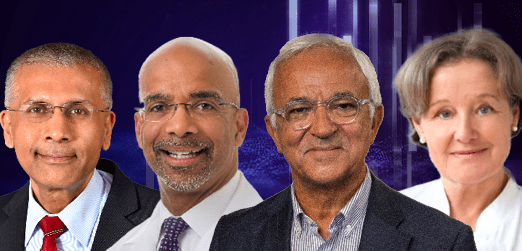- Home
- A Review of Emerging ARNI Data in HFrEF
A Review of Emerging ARNI Data in HFrEF
- Heart Failure
Available Credit:
- 1.00
Course Published On:
Course Expiry Date:

Overview
Despite advances in cardiovascular therapy, heart failure (HF) continues to be a leading cause of morbidity and mortality with significant cost to the health care system. Evidence for the angiotensin receptor-neprilysin inhibitor (ARNI) sacubitril/valsartan has demonstrated significant reductions in all-cause mortality, cardiovascular mortality, and HF hospitalization compared with enalapril and international guidelines currently recommend its use.
Despite this evidence and the recommendation of clinical guidelines, ARNI therapy is not initiated in the majority of eligible patients. Evidence suggests a lack of understanding of a patient’s risk and also the benefit of life saving therapies by physicians is a primary cause of under-utilization.
Increased education is needed so clinicians fully understand the patient’s risk, as well as latest mechanistic and clinical data to ensure confidence in using newer therapies.
This educational program summarises new data covering ARNI therapy for heart failure with reduced ejection fraction (HFrEF) presented at the European Society of Cardiology (ESC) 2019 congress.
Support Statement
This activity has been supported by an unrestricted educational grant from Novartis.
Disclosure
In compliance with EBAC / EACCME guidelines, all speakers/chairpersons participating in this programme have disclosed or indicated potential conflicts of interest which might cause a bias in the presentations.
The Organising Committee/Course Director is responsible for ensuring that all potential conflicts of interest relevant to the event are declared to the audience prior to the CME activities.
Terms & Conditions
Radcliffe Education requires contributors to our CME programmes to disclose any relevant financial relationships that have occurred within the past 12 months that could create a conflict of interest. These will be identified in the faculty section if applicable.
Instruction to Participants
There is no fee for taking part in this online learning activity.
Activities are designed to be completed within 60 minutes and must be completed by the registered user. Physicians should only claim credits for time spent on the activity. To successfully earn credit, participants must complete the activity in full in the indicated time frame.
To complete the course and claim certification participants must:
1. Read the course outline information supplied and complete pre-test questions if supplied prior to starting the activity. Users must read and study the activity in its entirety before completing the post-test questions.
2. Your results will be automatically saved and if a pass score is achieved (where applicable), you may be eligible to claim credit for the activity and receive a certificate of completion.
Target Audience
- Heart Failure Specialists
- General Cardiologists
Learning Objectives
Upon completion of this activity, participants will be able to:
- Review updated data of ARNI therapy for HFrEF present at the ESC 2019;
- understand the current utilisation of ARNI therapy in HFrEF (guidelines and databases);
- interpret potential mechanistic data related to the clinical benefit of ARNI therapy including imaging and biomarker data;
- apply new data covering the utilization of ARNI therapy in complex patients including recently decompensated and hospitalized; patients
- Apply clinical and real-world evidence data for the treatment HFrEF with ARNI therapy.
Module |
Title |
Duration |
Speakers |
|---|---|---|---|
| 1 | Welcome and Introduction | Andrew JS Coats (University of Warwick) Scott Solomon (Harvard Medical School, MA, US) | |
| 2 | ARIADNE in Review | Uwe Zeymer (Klinikum Ludwigshafen, DE) | |
| 3 | Commentary on the ARIADNE Trial | Andrew JS Coats (University of Warwick) Scott Solomon (Harvard Medical School, MA, US) | |
| 4 | PROVE-HF in Review | James L Januzzi (Harvard Medical School, MA, US) | |
| 5 | EVALUATE-HF in Review | Akshay S Desai (Harvard Medical School, MA, US) | |
| 6 | Commentary on the PROVE-HF and the EVALUATE-HF Trials | Andrew JS Coats (University of Warwick) Scott Solomon (Harvard Medical School, MA, US) | |
| 7 | TRANSITION-CHF in Review | Rolf Wachter (Universität Leipzig, Leipzig, DE) | |
| 8 | PIONEER in Review | David Morrow (Harvard Medical School, MA, US) | |
| 9 | Commentary on the TRANSITION-CHF and the PIONEER Trials | Andrew JS Coats (University of Warwick) Scott Solomon (Harvard Medical School, MA, US) | |
| 10 | Conclusions | Andrew JS Coats (University of Warwick) Scott Solomon (Harvard Medical School, MA, US) |
Welcome and Introduction
Duration:
Speakers: Andrew JS Coats (University of Warwick) Scott Solomon (Harvard Medical School, MA, US)
Commentary on the ARIADNE Trial
Duration:
Speakers: Andrew JS Coats (University of Warwick) Scott Solomon (Harvard Medical School, MA, US)
Commentary on the PROVE-HF and the EVALUATE-HF Trials
Duration:
Speakers: Andrew JS Coats (University of Warwick) Scott Solomon (Harvard Medical School, MA, US)
Commentary on the TRANSITION-CHF and the PIONEER Trials
Duration:
Speakers: Andrew JS Coats (University of Warwick) Scott Solomon (Harvard Medical School, MA, US)
Conclusions
Duration:
Speakers: Andrew JS Coats (University of Warwick) Scott Solomon (Harvard Medical School, MA, US)
Course Director
Speaker
The event ‘A Review of Emerging ARNI Data in HFrEF’ is accredited by the European Board for Accreditation in Cardiology (EBAC) for 1 hour of external CME credits.
Each participant should claim only those hours of credit that have actually been spent in the educational activity. EBAC works according to the quality standards of the European Accreditation Council for Continuing Medical Education (EACCME), which is an institution of the European Union of Medical Specialists (UEMS).
Through an agreement between the European Board for Accreditation in Cardiology and the American Medical Association, physicians may convert EBAC External CME credits to AMA PRA Category 1 Credits™. Information on the process to convert EBAC credit to AMA credit can be found on the AMA website.
















